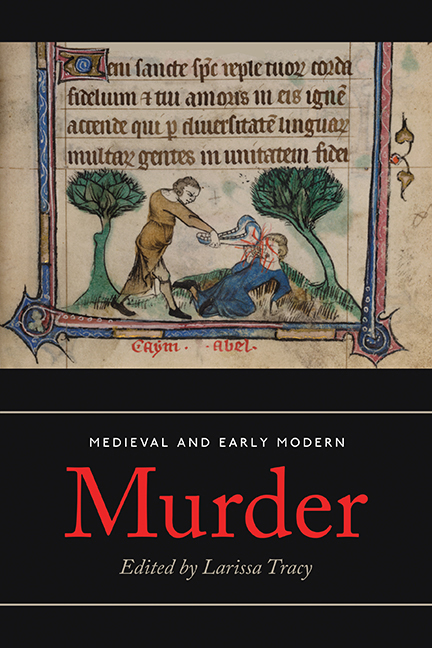Book contents
- Frontmatter
- Contents
- List of Illustrations and Tables
- Acknowledgements
- Contributors
- List of Abbreviations
- Introduction: Murder Most Foul
- I Murder on Trial: Justice, Law and Society
- 1 Secret Killing and Murder by Magic in the Law of Adomnán
- 2 Discursive Murders: The St Brice's Day Massacre, Beowulf and Morðor
- 3 Mourning Murderers in Medieval Jewish Law
- 4 Treacherous Murder: Language and Meaning in French Murder Trials
- 5 ‘Mordre wol out’: Murder and Justice in Chaucer
- II The Public Hermeneutics of Murder: Interpretation and Context
- III Murder in the Community: Gender, Youth And Family
- Conclusion
- Select Bibliography
- Index
5 - ‘Mordre wol out’: Murder and Justice in Chaucer
from I - Murder on Trial: Justice, Law and Society
Published online by Cambridge University Press: 05 July 2018
- Frontmatter
- Contents
- List of Illustrations and Tables
- Acknowledgements
- Contributors
- List of Abbreviations
- Introduction: Murder Most Foul
- I Murder on Trial: Justice, Law and Society
- 1 Secret Killing and Murder by Magic in the Law of Adomnán
- 2 Discursive Murders: The St Brice's Day Massacre, Beowulf and Morðor
- 3 Mourning Murderers in Medieval Jewish Law
- 4 Treacherous Murder: Language and Meaning in French Murder Trials
- 5 ‘Mordre wol out’: Murder and Justice in Chaucer
- II The Public Hermeneutics of Murder: Interpretation and Context
- III Murder in the Community: Gender, Youth And Family
- Conclusion
- Select Bibliography
- Index
Summary
IN MODERN PARLANCE, the phrase ‘murder will out’ means that any secret will eventually be revealed, that murder cannot go undetected. The roots of this idiom can be traced back to Geoffrey Chaucer's Nun's Priest's Tale, part of his fourteenth-century Canterbury Tales (c. 1388–1392), in which the hysterical Chaunticleer (a well-known rooster of French fable) dreams of murder in his sleep, imagining it as a portent of his own death in the jaws of the ever-present, preying fox Reynard. But Chaunticleer and his (primary) wife Pertelote bicker like hens over its significance, and she dismisses his fear, telling him ‘“For Goddes love, as taak som laxatyf “’ (2943). On the surface, murder seems a side note to the greater concerns of the narrative: the pride of Chaunticleer and his willingness to listen to Pertelote that lands him in mortal danger, the very danger that he imagined from the beginning. And yet, amidst the humour and satire, this episode reveals a distinct desire for justice in the discovery and prosecution of murder, while at the same time cautioning against the application of judicial torture in the process of law. When Chaucer composed his version of the Chanticleer/Reynard fable, England was embroiled in civil unrest, which manifested in uprisings and rebellions like the Peasants’ Revolt in 1381, as well as royal intrigue and dissent that led to the deposition of King Richard II in 1399 and his murder (through starvation) in 1400 – the same year of Chaucer's death. Murder, treason and violence were prominent features of the late fourteenth-century political and social landscape, often echoed in Chaucer's Canterbury Tales. Ultimately, in this seemingly silly beast fable and other tales of murder in the Canterbury Tales, Chaucer draws sharp distinctions between illicit murder, mob violence and justice, thus suggesting that overstepping legal boundaries in the application of torture, even in the correct prosecution of murder, has a destabilising effect and potentially leads to further violence and bloodshed.
Murder occurs in many of Chaucer's tales.
- Type
- Chapter
- Information
- Medieval and Early Modern MurderLegal, Literary and Historical Contexts, pp. 115 - 136Publisher: Boydell & BrewerPrint publication year: 2018



